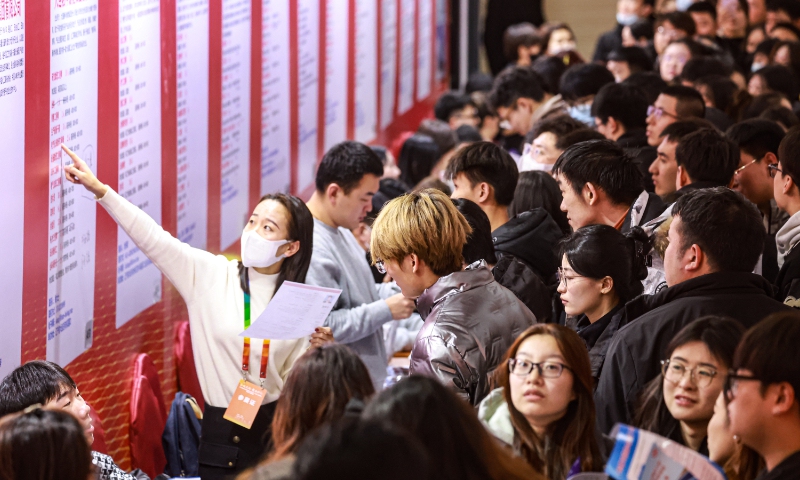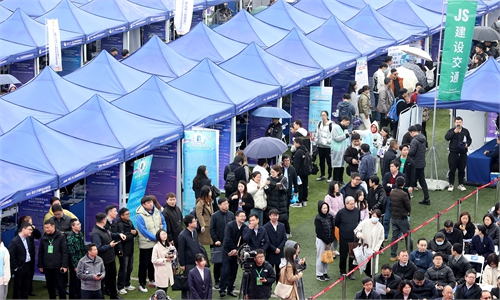
A recruiter explains job responsibilities to applicants at a recruitment fair in Shenyang, Northeast China's Liaoning Province, on February 28, 2024. The fair has gathered more than 2,000 enterprises, offering nearly 40,000 jobs. In order to boost employment, job fairs are being held nationwide. Photo: VCG
China's Ministry of Human Resources and Social Security has concluded its three-month spring recruitment campaign, distributing more than 6.6 billion yuan ($930 million) in subsidies, showing the government's latest efforts for supporting employment.
During the campaign, the ministry announced that it held about 64,000 recruitment events, offering more than 43 million jobs, marking a 10 percent increase both in terms of events held and jobs created year-on-year, as reported by CCTV.com.
As part of the ministry's yearly efforts in supporting employment, this year's spring recruitment campaign started on January 25, aiming to provide employment services to migrant workers and enterprises with hiring needs across the country.
This year's campaign, compared with previous events, put more focus on guiding job hunters to find jobs that are more market-oriented, Zhou Rong, a senior researcher at the Chongyang Institute for Financial Studies at Renmin University of China, told the Global Times on Sunday.
The campaign not only aimed to match job seekers with market opportunities but also covered follow-up assessments to each recruitment, which is a significant improvement compared with previous years, Zhou added.
The ministry said that the recruitment activities spanned various sectors including traditional manufacturing, services and high-tech, providing targeted support for college graduates, migrant workers and entrepreneurs.
The campaign has provided job opportunities from industry-leading companies, including Foxconn and BYD, allowing locals to secure good jobs without leaving their hometowns, a worker surnamed Zhang who participated in a recruitment event in Zhengzhou, Central China's Henan Province, told the Global Times on Sunday.
Moreover, the recruitment campaign paid special attention to vulnerable groups, such female job applicants who lack professional skills and have been unemployed for a long time, by providing them with flexible jobs. Targeted job fairs were also held in regions devastated by natural disasters.
This year's campaign was particularly down-to-earth, delivering supportive policies and services directly to job applicants, Zhou noted.
Additionally, China's evolving industrial landscape and development of new quality productive forces are continuously creating new employment opportunities in some emerging industries such as artificial intelligence (AI).
According to a report that Zhaopin.com sent to the Global Times, there were remarkable rises in AI-related jobs and salaries in the first quarter of this year. For example, the number of jobs for natural language processing engineers rose by 126 percent year-on-year, while salaries increased by 12 percent to 24,535 yuan (3451) per month.
A report from domestic recruitment platform Liepin.com indicated a dramatic 321.7 percent year-on-year increase in job positions related to AI-created content in the first quarter, reflecting a rising demand for talent in the booming industry. The number of applicants in this segment soared by 946.84 percent year-on-year.

